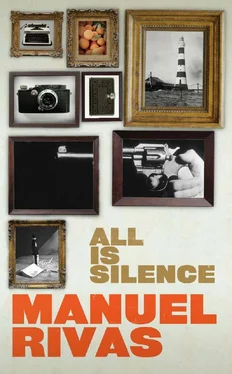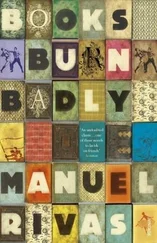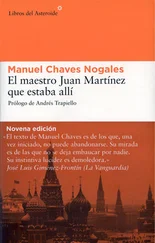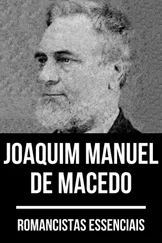‘Trout, you say? You’re far too polite. Are they all this filthy?’
‘No, sir. There are three clean ones. They had a bad time.’
‘A bad time? Why? Because they were carrying out their duty?’
‘They’re off sick. Severe depression.’
‘Depression!’
Lieutenant Colonel Alisal marched towards the barracks building. His indignation could be heard moving through the gears. As he walked, he expressed his thoughts aloud, ‘Three honourable, sick men. Well, that is something!’ Suddenly he stopped and turned to Fins. ‘What’s going on here? Please explain it to me.’
Fins was always at the ready, but even so he couldn’t pinpoint the right answer. He might have said, ‘Corruption, sir, and this is just the tip of the iceberg.’ But he didn’t like to be direct. He was never that direct. Lieutenant Colonel Alisal gazed up at the front of the building, the motto ‘All for the Fatherland’, and then sought out the sea’s horizon. It was a thick, dark, oily sea, across which slid and swept a ragged bunch of clouds.
‘All of this on account of some tobacco and a handful of drugs?’
‘That’s prehistory, sir.’
‘But the statistics… This doesn’t comply with the statistics. We’ve increased the number of seizures.’
The lieutenant colonel stopped in front of the guard standing sentry at the entrance to the building.
‘I wish to talk to the superintendent on duty. At once!’
The guard raised his eyebrows. He didn’t like that tone, especially coming from a civilian.
‘At once? Who are you then, the Generalissimo?’
The lieutenant colonel took his papers out of the inner pocket of his jacket.
‘I am Lieutenant Colonel Party Pooper.’
The guard checked his papers. Immediately stood to attention.
‘At your orders, sir!’
He was about to call the sergeant in the guardroom. Tell him to find the superintendent as quickly as possible. But this plain-clothes superior didn’t seem too worried about formalities. He had other obsessions. ‘Tell me, which of these cars is yours?’
The guard glanced at the third man, who had remained silent. He knew him from somewhere, but couldn’t quite place him. He had the appearance of a shadow. Fins, however, knew who the guard was. One clue had led to another without him even trying. Most of the cars had been bought from the same dealer. They hadn’t even bothered to cover their tracks. The owner shared business interests with Mariscal. Though the latter wasn’t exactly crazy about cars. He still drove his 1966 Mercedes-Benz. Its tail fins formed part of the Wild West landscape.
‘Are you happy, does it run well?’
‘I can’t complain. The car runs well. If you increase your speed, the consumption goes up. But I’m not one to do that.’
‘At ease!’
‘Thank you very much, sir.’
‘AN INTERVIEW? WHAT for, counsellor? Cui prodest? ’
‘You do. You stand to gain. You’re a gentleman, you can’t go down in history as a cattle thief.’
Óscar Mendoza had already accepted on his behalf. An image campaign, he explained. Cui prodest. Cui bono , etc., etc. He had nothing to lose. On the contrary, everything to gain.
‘I already have a good image,’ countered Mariscal. ‘I’m known as a bit of a Casanova.’
The lawyer played along. ‘That’s right, but it could be bettered. Do you know what Churchill used to say? “History will be kind to me, for I intend to write it.”’
‘Who said that?’
‘Churchill,’ repeated Mendoza. ‘Winston Churchill.’
‘I know who Churchill is, counsellor!’
Mariscal used this occasion to tell a story with mocking familiarity. ‘My father sold him wolfram at a good price. He sold it to the others as well. The Nazis wanted wolfram to make weapons and the Brits to stop them. On occasion, like other people, my father would sell the same material twice.’
‘A real neutral!’ exclaimed Mendoza.
That’s right. A neutral. Many border fortunes had been amassed as a result of this mineral needed for Hitler’s cannons. Mutatis mutandis . He rather liked the idea of an image campaign. He touched his neck with his hand, pinched the skin of his double chin. The last time he’d come face to face with a journalist had been to give him a warning. Right there, on the chin.
‘They say you’re the perfect example of a self-made man, Mr Brancana.’
‘Don’t beat about the bush. Call me Mariscal.’
He stared at the journalist in silence. Made out he was considering her statement when in fact he was thinking about her. She knew. There was an animal intelligence in her eyes. He noticed this because the first thing she did on entering the Ultramar’s back room was pay attention to the little owl. And when they sat down, on opening her notebook the first words she wrote, as he could see upside down, were ‘little owl’. The blinds were half lowered and filtered a staircase of light. Mariscal had lit a Havana cigar, the smoke of which rose in rings that lazily came back to ground. He soon saw that extended periods of silence made her nervous, and this discomfort on her part made him feel secure. The animal’s eyes were intelligent, but also meek. He liked this. He didn’t have time for high voltage.
‘What I mean,’ continued the journalist, ‘is that you got to where you are through your own efforts.’
‘ Sensu stricto , miss.’
‘Lucía. Lucía Santiso.’
Good, Lucía, good. He felt at ease. He puffed out his chest and came out with one of his favourite quotations: ‘A man’s gotta do what a man’s gotta do.’
‘Do you also speak English?’
‘I speak lots of languages. I’m a troglodyte.’
He let out a guffaw. He had no problem laughing at himself. ‘The sea brings everything. Languages float as well. You just have to have a good ear. What do you think of John Wayne?’
The girl smiled. She’d end up being the one interviewed.
‘He’s from another time. The Man Who Shot Liberty Valance . I liked him in that.’
‘A man is a man,’ replied Mariscal transcendentally. ‘That doesn’t belong to another time, miss. That is intemporal. Cinema began with Westerns. And will go to hell, is already going to hell, when there are no more Westerns. It’s the decline of the classic genres. Write that down.’
‘I will do,’ she said agreeably. ‘We were saying you were a self-made man.’
‘Let’s just say I learned how to ride out the storm in my own dinghy. Without fear, but with common sense. You have to pray, yes, but never let go of the helm. What was it that sank the Titanic ? A blasted lump of ice? No, it was the pace of greed, a loss of perspective. Man yearns to be God, but he’s just… a worm. That’s right, a drunken worm who thinks he’s in control of the hook.’
‘Mr Mariscal, people say…’
Mariscal pointed with his cigar at the journalist’s notebook. ‘Did you write down that bit about God and the worm?’
Lucía Santiso nodded uneasily. She knew the interview had been agreed between the editor-in-chief of the Gazeta and the lawyer Mendoza. There were a few ground rules. But Mariscal was growing far too much, his head, eyes, arms, everything, while she felt diminished.
‘Mr Mariscal, your name is often bandied about as that of future mayor and possibly even senator.’
Mariscal joked, making out he was on stage: ‘Ladies and gentlemen, before I speak, I would like to say a few words…’ He didn’t carry on until the journalist had let out a convincing laugh.
‘Listen, Lucía… Can I call you that? Yes, good. I’m a dried fig by now, I’m not a danger to women,’ and as he said this, he winked at her. ‘Though dangerous women still get me going. Once a gallant, always a gallant. Don’t write that down.’
Читать дальше












